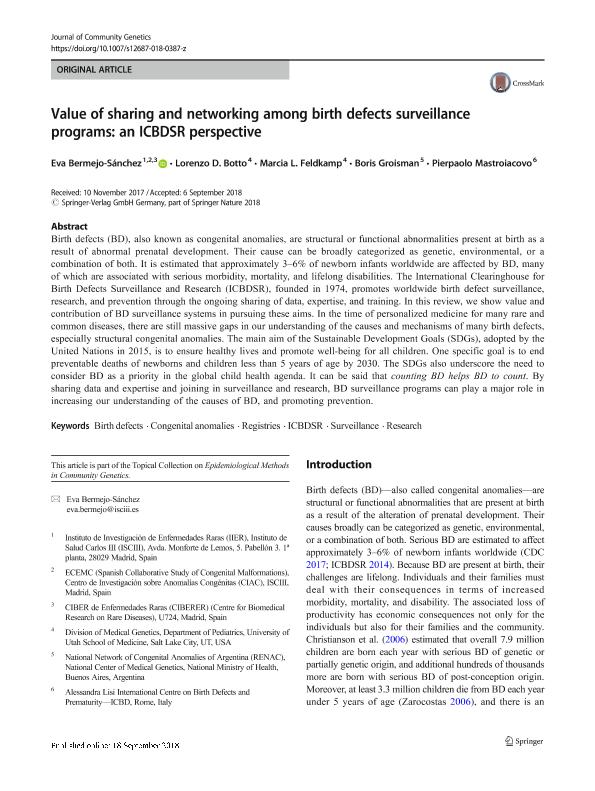Artículo
Value of sharing and networking among birth defects surveillance programs: an ICBDSR perspective
Bermejo Sánchez, Eva; Botto, Lorenzo; Feldkamp, Marcia L.; Groisman, Boris ; Mastroiacovo, Pierpaolo
; Mastroiacovo, Pierpaolo
 ; Mastroiacovo, Pierpaolo
; Mastroiacovo, Pierpaolo
Fecha de publicación:
10/2018
Editorial:
Springer
Revista:
Journal of Community Genetics
ISSN:
1868-310X
e-ISSN:
1868-6001
Idioma:
Inglés
Tipo de recurso:
Artículo publicado
Clasificación temática:
Resumen
Birth defects (BD), also known as congenital anomalies, are structural or functional abnormalities present at birth as a result of abnormal prenatal development. Their cause can be broadly categorized as genetic, environmental, or a combination of both. It is estimated that approximately 3–6% of newborn infants worldwide are affected by BD, many of which are associated with serious morbidity, mortality, and lifelong disabilities. The International Clearinghouse for Birth Defects Surveillance and Research (ICBDSR), founded in 1974, promotes worldwide birth defect surveillance, research, and prevention through the ongoing sharing of data, expertise, and training. In this review, we show value and contribution of BD surveillance systems in pursuing these aims. In the time of personalized medicine for many rare and common diseases, there are still massive gaps in our understanding of the causes and mechanisms of many birth defects, especially structural congenital anomalies. The main aim of the Sustainable Development Goals (SDGs), adopted by the United Nations in 2015, is to ensure healthy lives and promote well-being for all children. One specific goal is to end preventable deaths of newborns and children less than 5 years of age by 2030. The SDGs also underscore the need to consider BD as a priority in the global child health agenda. It can be said that counting BD helps BD to count. By sharing data and expertise and joining in surveillance and research, BD surveillance programs can play a major role in increasing our understanding of the causes of BD, and promoting prevention.
Palabras clave:
BIRTH DEFECTS
,
CONGENITAL ANOMALIES
,
ICBDSR
,
REGISTRIES
,
RESEARCH
,
SURVEILLANCE
Archivos asociados
Licencia
Identificadores
Colecciones
Articulos(SEDE CENTRAL)
Articulos de SEDE CENTRAL
Articulos de SEDE CENTRAL
Citación
Bermejo Sánchez, Eva; Botto, Lorenzo; Feldkamp, Marcia L.; Groisman, Boris; Mastroiacovo, Pierpaolo; Value of sharing and networking among birth defects surveillance programs: an ICBDSR perspective; Springer; Journal of Community Genetics; 9; 4; 10-2018; 411-415
Compartir
Altmétricas



